
Cuisine
Ethiopian cuisine
Ethiopian cuisine is heavily influenced by the country's geography and history. The cuisine is characterized by its use of spices, herbs, and chili peppers. Meat dishes are popular, as well as vegetarian and vegan options. Injera, a sourdough flatbread, is a staple in Ethiopian cuisine and is used as a utensil to scoop up stews and sauces.
Typical ingredients
Berbere spice blend, Teff flour, Injera, Lentils, Chickpeas, Lamb, Beef, Chicken, Fish, Tomatoes, Onions, Garlic, Ginger, Cumin, Coriander, Cardamom, Cinnamon, Cloves, Nutmeg, Turmeric, Fenugreek
Presentation and garnishing
Dishes are often presented on a large platter with injera in the center and various stews and sauces arranged around it. Garnishes may include fresh herbs, sliced tomatoes, and onions.
Ethiopian cuisine is often served in a communal style, with large platters of food shared among diners. Coffee ceremonies are also an important part of Ethiopian culture and are often held to mark special occasions.
More cuisines from this region...
Kenyan cuisine, Tanzanian cuisine, Eritrean cuisine, Rwandan cuisine, Somali cuisine, Ugandan cuisine, Maasai cuisine, Burundian cuisine, South Sudanese cuisine, Djiboutian cuisine
History
Ethiopian cuisine has a long history dating back to ancient times. The country's location on the Horn of Africa made it a hub for trade and cultural exchange. Over time, Ethiopian cuisine has been influenced by neighboring countries such as Eritrea, Somalia, and Yemen. The cuisine has also been shaped by the country's history of colonization and struggle for independence.
Cultural significance
Food is an important part of Ethiopian culture and is often shared with family and friends. Meals are typically eaten with the hands, using injera to scoop up stews and sauces. Coffee is also an important part of Ethiopian culture and is often served after meals.
Health benefits and considerations
Ethiopian cuisine is generally healthy, with a focus on fresh ingredients and spices. However, some dishes may be high in fat and calories. Injera is also high in carbohydrates and may not be suitable for those with gluten intolerance.
Ethiopian cuisine dishes Browse all »

Fit-fit
Fit-fit is a traditional Ethiopian dish made with injera bread and spices. It is a flavorful and filling meal that can be enjoyed for breakfast, lunch, or dinner.

Himbasha
Himbasha is a traditional Ethiopian bread that is sweet and slightly spiced. It is often served during special occasions and celebrations.

Bayenetu
Vegetarian Platter
Bayenetu is a traditional Ethiopian dish made with injera and a variety of stews.

Inguday tibs
Mushroom Tibs
Inguday tibs is a traditional Ethiopian dish that is made with mushrooms and a variety of spices. It is a flavorful and aromatic dish that is perfect for a vegetarian meal.

Awaze Sauce
Awaze sauce is a traditional Ethiopian sauce made with a blend of spices, chiles, and berbere spice. It has a bold, complex flavor that is both spicy and savory.

Wat
Spicy Stew
Wat is a traditional Ethiopian stew made with a variety of vegetables and a blend of spices. It is a flavorful and hearty dish that is perfect for any occasion.

Goraasa
Goraasa is a traditional Ethiopian dish made with injera bread and a spicy meat filling.

Kitfo
Kitfo is an Ethiopian dish that consists of raw minced beef that is seasoned with spices and served with injera, a sourdough flatbread. It is a flavorful and spicy dish that is...
Ethiopian cuisine recipes Browse all »

Ethiopian Spiced Butter Cake
Aromatic Delight: Ethiopian Spiced Butter Cake
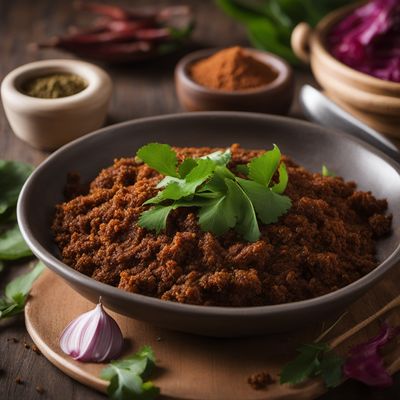
Kocho Delight
Savory Ethiopian Kocho Rolls

Ethiopian Spiced Cuchuflí
Zesty Ethiopian Twist on Cuchuflí: A Spiced Delight
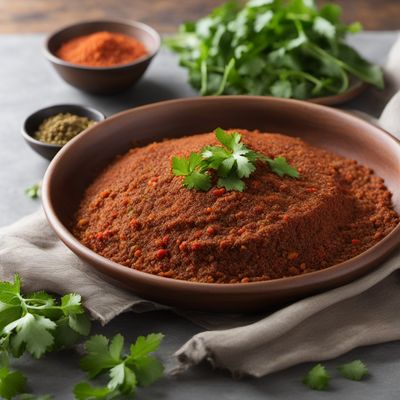
Injera Fit-Fit with Spiced Lentils and Vegetables
Ethiopian Delight: Spiced Lentil and Vegetable Injera Fit-Fit

Derek Tibs with Spiced Butter Sauce
Sizzling Ethiopian Beef with Fragrant Spiced Butter Sauce

Ethiopian Bayenetu Feast
A Taste of Ethiopia: Bayenetu - A Platter of Flavors and Traditions
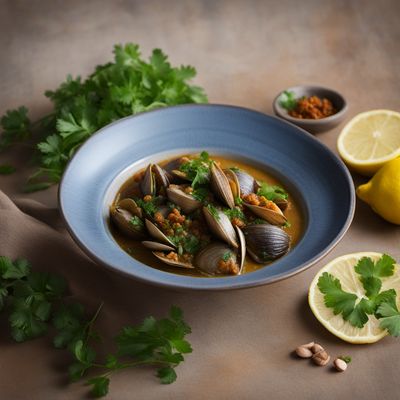
Ethiopian Spiced Clams Oreganata
Zesty Ethiopian Clams Oreganata: A Fusion of Flavors
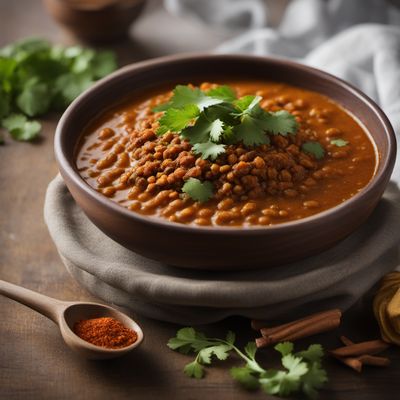
Ethiopian Spiced Lentil Stew
Savor the Richness: Ethiopian Spiced Lentil Stew
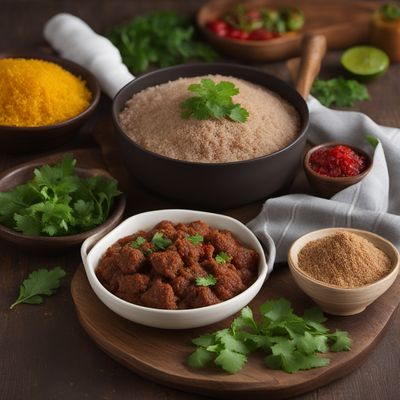
Authentic Ethiopian Kitfo Recipe
Spiced Ethiopian Beef Tartare: Kitfo Delight

Himbasha - Ethiopian Sweet Bread
Ethiopian Delight: Himbasha - A Sweet Bread to Savor

Ethiopian-style Potato with Spiced Yogurt
Abyssinian Delight: Spiced Potato with Tangy Yogurt

Ethiopian Lentil Salad
Spiced Lentil Delight: A Flavorful Ethiopian Salad